Unit 5 Let's celebrate单元复习课件
文档属性
| 名称 | Unit 5 Let's celebrate单元复习课件 |  | |
| 格式 | pptx | ||
| 文件大小 | 13.7MB | ||
| 资源类型 | 试卷 | ||
| 版本资源 | 牛津译林版 | ||
| 科目 | 英语 | ||
| 更新时间 | 2021-08-19 16:58:49 | ||
图片预览

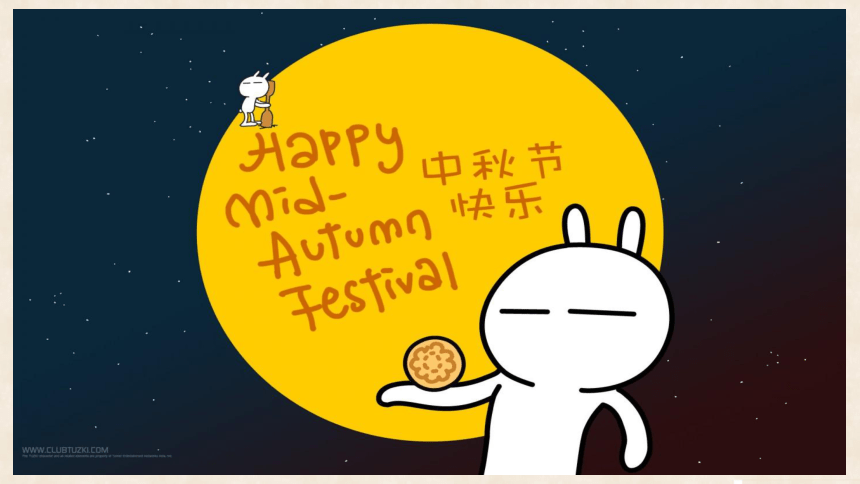
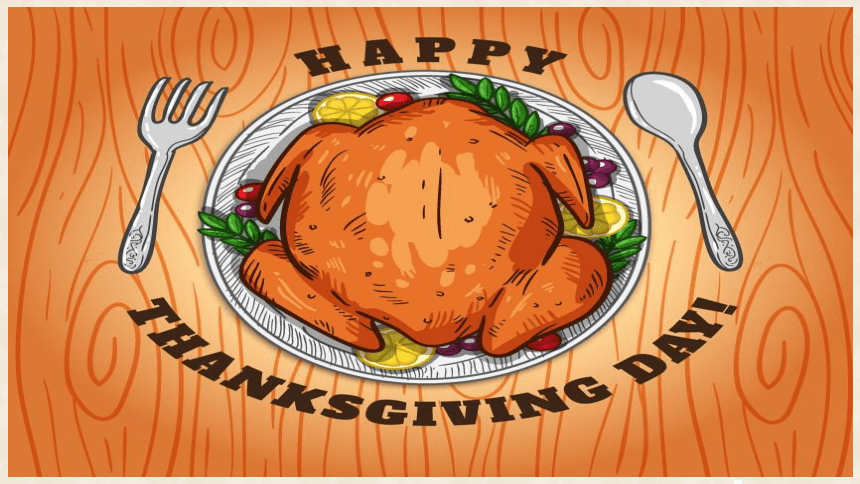



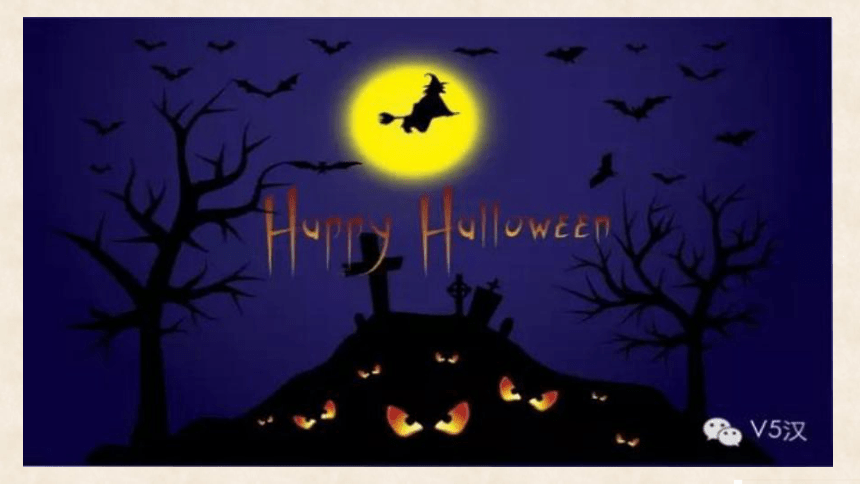
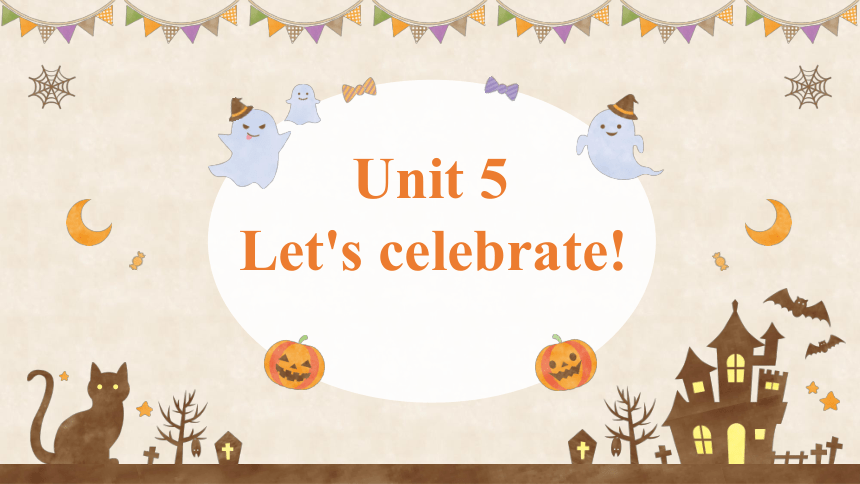
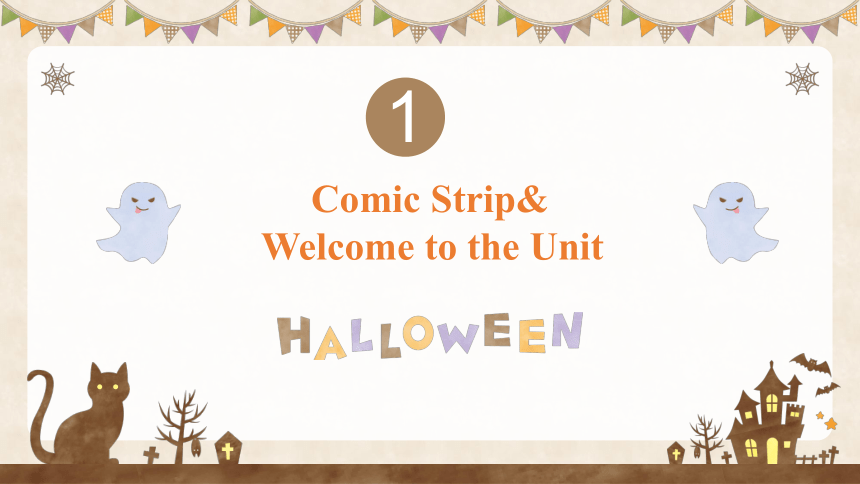
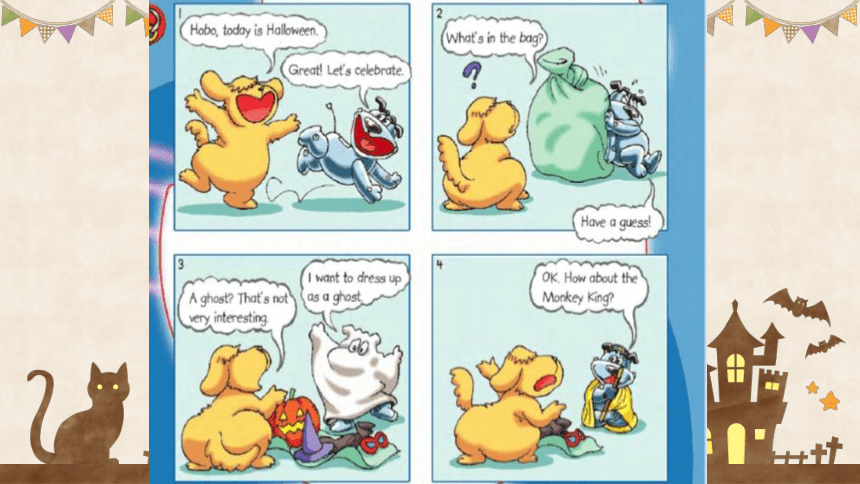
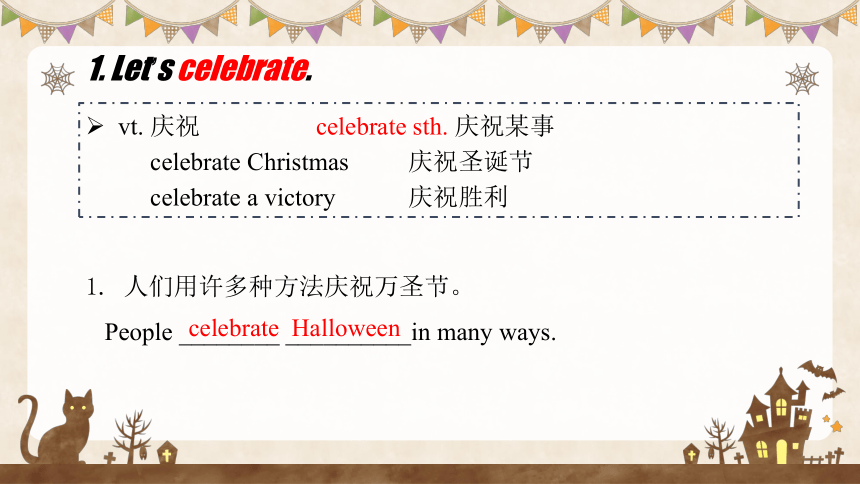
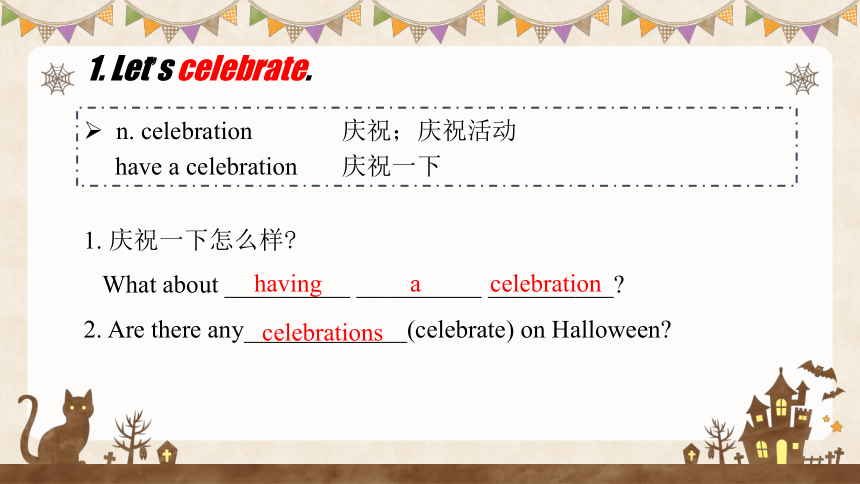
文档简介
(共69张PPT)
Children
play
happily
on
that
day
Unit
5
Let's
celebrate!
Comic
Strip&
Welcome
to
the
Unit
1
1.
Let’s
celebrate.
1.
人们用许多种方法庆祝万圣节。
People
________
__________in
many
ways.
celebrate
Halloween
vt.
庆祝
celebrate
Christmas
庆祝圣诞节
celebrate
a
victory
庆祝胜利
celebrate
sth.
庆祝某事
1.
庆祝一下怎么样?
What
about
__________
__________
__________?
2.
Are
there
any_____________(celebrate)
on
Halloween?
having
a
celebration
celebrations
n.
celebration
庆祝;庆祝活动
have
a
celebration
庆祝一下
1.
Let’s
celebrate.
2.
Have
a
guess!
have
a
talk
have
a
drink
have
a
rest
have
a
walk
have
a
look
谈话
休息
看一看
喝饮料
散步
n.
猜;猜测
You
can
have
a
guess.
你可以猜一猜。
vt.
猜;猜测
guess
riddles
猜谜语
3.
I
want
to
dress
up
as
a
ghost.
1.
你能帮我给这个孩子穿上衣服吗?
Could
you
_____
_____
_____
_____
_____?
help
me
dress
the
child
dress
the
child
for
me
dress
v.
穿
dress
sb.
给某人穿衣服
(表动作)
1.这个男孩不会给自己穿衣服。
The
boy
can’t
_______
_______.
The
boy
can’t
______
________.
2.她穿着一件红色的外套。
She
______
______
______
a
red
coat.
is
dressed
in
get
dressed
dress
himself
get
dressed/dress
oneself
给自己穿衣服(表动作)
be
dressed
in
=
wear
(表状态)
3.
I
want
to
dress
up
as
a
ghost.
3.
I
want
to
dress
up
as
a
ghost.
1.史密斯先生在圣诞节打扮成圣诞老人。
Mr.
Smith
______
______
______
Father
Christmas
on
Christmas
Day.
dresses
up
as
dress
up
打扮;乔装打扮;盛装打扮
dress
up
as...
打扮成...
3.
I
want
to
dress
up
as
a
ghost.
1.
As
a
pupil,
you
must
work
hard.
作为一名学生,你必须努力学习。
2.
She
wants
to
work
as
a
model.
她想当一名模特。
3.
The
girls
dress
up
as
boys.
女孩们扮作男孩的样子。
as
作为,当作;如同
3.
I
want
to
dress
up
as
a
ghost.
1.
I
don’
t
have
time
to
watch
TV,
as
I
have
a
lot
of
homework
to
do.
2.
这个女孩边唱边跳。
The?girl?dances?_____?she?sings.?
我没时间看电视,因为我有许多作业要做。
as
as
当……时候;因为
3.
I
want
to
dress
up
as
a
ghost.
1.
他和你一样高。
He
is
______
tall
_______
you.
as
as
as...as
和……一样
4.
That’s
not
very
interesting!
interesting
有趣的
指人或事物本身具有的性质,主语通常是物。
interested
感兴趣的
指某人对某物感兴趣,主语通常是人。
be
interested
in
(doing)sth.
对……感兴趣
.
形容词
(adj.)
4.
That's
not
very
interesting!
拓展:
surprised
—
surprising
bored
—
boring
excited
—
exciting
adj.
以-ed结尾:多形容人,表示“人感到…”
adj.
以-ing结尾:多形容物,表示“令人感到…
Practice
1.
The
story
is
very
___________(interest).
2.
我对这个有趣的故事感兴趣。
I
________
_________
________
________
_________
story.
3.
Mary
has
a
great
________(interest)
in
French
food.
interesting
am
interested
in
this
interesting
interest
4.
That's
not
very
interesting!
have/take
(an)
interest
in…
对……感兴趣
have
no
interest
in…
对……没兴趣
places
of
interest
这里有一篇文章。也许你会感兴趣。
Here’s
an
article.
It
might
interest
you.
名胜
interest
n.
兴趣,趣味
vt.
使(人)产生兴趣
Practice
1.
我对学习英语有极大的兴趣。
I
______
______
_______
_______
_____
________
English.
2.
我对打电脑游戏没有兴趣。
I
______
_______
________
______
_______
computer
games.
3.
Most
of
us
are
______
in
the
______
film.
A.
interesting;
interested
B.
interesting;
interesting
C.
interested;
interested
D.
interested;
interesting
have
a
great
interest
in
learning
have
no
interest
in
playing
一言辨异
The
interesting
foreign
people
are
interested
in
many
places
of
interest
in
China.
这些有趣的外国人对中国的许多名胜感兴趣。
5.
Millie
learns
about
different
festivals
around
the
world.
around
the
world
全世界
=
all
over
the
world
=
all
round
the
world
=
throughout
the
world
我弟弟长大后想环游世界。
My
younger
brother
wants
to
travel
_______
_______
_______
when
he
grows
up.
around
the
world
6.
All
my
family
get
together
and
have
a
big
dinner.
get
together
聚集,集合
get
together
with
sb.
和聚会,联欢
1.
我喜欢和我的家人在中秋节聚会联欢。
I
like
to
______
_______
________
________
________
at
the
Mid-Autumn
Festival.
get
together
with
my
family
6.
All
my
family
get
together
and
have
a
big
dinner.
一般情况下,不加冠词
have
breakfast/lunch/breakfast
当三餐前有形容词时,加冠词a/an;
have
a
happy
dinner
若表示特指,加冠词the
7.
Then
we
eat
moon
cakes
and
enjoy
the
full
moon.
adj.
满的,充满的;完全的
反义词:empty
be
full
of
=
be
filled
with
充满……
adj.
饱的
反义词:hungry
1.
盒子里装满了苹果。
The
box
______
______
______
apples.
=
The
box
______
______
______
apples.
2.
我饱了。不能再吃了
I’m
full.
I
can’t
eat
any
more.
is
full
of
is
filled
with
(南京市初中毕业生学业考试)
原文:Tortillas
are
usually
flat
and
round,
but
they
can
also
be
made
into
other
shapes.
Taco
shells
are
made
from
corn
tortillas
and
filled
with
beans
or
meal.
Tasty
sauces,
called
salsas,
are
often
added
to
tacos.
These
sauces
are
made
from
tomatoes,
onions,
hot
pepers
and
spices.
题目:Taco
shells
are
made
from
corn
tortillas
and
_____
of
beans
or
meat.
full
2
Reading
8.
Thank
you
for
telling
me
about
the
Mid
Autumn
Festival.
Thank
you
for
(doing)sth.
感谢某人做某事
=
Thanks
for
(doing)sth.
1.
Thank
you
for
_______
me
with
my
English.
A.
help
B.
helps
C.
helping
D.
to
help
8.
Thank
you
for
telling
me
about
the
Mid
Autumn
Festival.
tell
sb.
about
sth.
告诉某人关于某事
tell
sb.
sth
=
tell
sth.
to
sb.
tell
sb.
(that)...
告诉某人……
1.
Can
you
tell
me
your
name?
=
Can
you
tell
______
______
______
______?
2.
Our
English
teacher
often
tells
us
______
friends
is
very
good
for
us.
A.
making
B.
makes
C.
make
D.
to
make
your
name
to
me
8.
Thank
you
for
telling
me
about
the
Mid
Autumn
Festival.
tell
sb.
to
do
sth.
告诉某人去做某事
tell
sb.
not
to
do
sth.
告诉某人不要去做某事
1.
Mum
tells
me
________(
drink
)
some
milk
every
day.
2.
My
father
told
me
______
TV.
A.
not
to
watch
B.
don’t
watch
C.
not
watching
D.
doesn’t
watch
to
drink
9.
We
knock
on
their
doors
and
shout
“trick
or
treat”.
knock
vi.
敲
knock
on/at...
1.
有人正在敲门。
Someone
_______
________
_______
the
door.
2.
She
knocked
________the
window.
A.
from
B.
on
C.
in
D.
by
3.
Listen!
There
is
a
loud
knock
______
the
door.
Who
can
it
be?
A.
from
B.
on
C.
in
D.
by
is
knocking
at
n.
敲,打击声
9.
We
knock
on
their
doors
and
shout
“trick
or
treat”.
shout
to
sb.
由于听不到而高声喊叫
shout
at
sb.
生气时对某人大喊大叫,态度不友好
1.
我向她喊让他帮帮我。
I
shout
to
her
to
help
me.
2.
不要对那位老人大声叫嚷。
Don’t
shout
at
the
old
man.
Practice
1.
Tom,
_____________
(not
shout).
I
can
hear
you.
2.The
bag
is
on
the
street.
The
children
shout
______
the
driver.
A.
at
B.
to
C.
on
D.
with
don’t
shout
10.
Usually
they
give
us
some
candy
as
a
treat.
give
sb.
sth.
=
give
sth.
to
sb.
给某人某物
1.
请给我一杯水。
Please
_______
a
glass
of
water
______
_______.
Please
_______
_______
a
glass
of
water.
give
to
me
give
me
10.
Usually
they
give
us
some
candy
as
a
treat.
give
sb.
sth.
as
a
treat
用某物招待某人
=
treat
sb.
with
sth.
1.
他们用水饺招待我们。
They
______
______
dumplings
______
______
______.
=
They
______
______
______
dumplings.
give
us
as
a
treat
treat
us
with
10.
Usually
they
give
us
some
candy
as
a
treat.
candy
不可数名词:糖果
一盒糖果:a
box
of
candy
一块糖果:a
piece
of
candy
candy
可数名词:糖果种类
11.
If
they
don’t
give
us
a
treat,
we
play
a
trick
on
them.
if
conj.
如果
引导条件状语从句:主将从现
1.
---
We’ll
go
for
a
picnic
if
it
______
this
Sunday.
---
Wish
you
a
lovely
weekend.
A.
rain
B.
doesn’t
rain
C.
won’t
rain
D.
isn’t
rain
2.
If
you
______
(fail)
the
exam,
you
will
let
him
down.
fail
11.
If
they
don’t
give
us
a
treat,
we
play
a
trick
on
them.
give
sb.
a
treat
=
treat
sb.
招待某人
play
a
trick
on
sb.
=
play
a
joke
on
sb.
和某人开玩笑,捉弄某人
1.
Mrs.
Brown
always
gives
her
guests
a
big
treat.
Mrs.
Brown
always
__________
her
guests.
2.
The
children
like
playing
tricks
______
each
other.
A.
with
B.
at
C.
on
D.
for
treats
12.
People
make
lanterns
out
of
oranges.
make
sth.
out
of
/
with…
用……制成某物
be
made
of…
由……制成(看得出原材料)
be
made
from…
由……制成(看不出原材料)
Practice
1.
纸是由树木制成的。
The
paper
______
______
______
wood.
2.
这座桥是用石头建成的。
The
bridge
______
______
______stone.
3.
人们用葡萄酿酒。
People
______
wine
______
______
grapes.
is
made
of
is
made
of
make
out
of
3
Grammar
特殊疑问词
疑问代词
指
人:
who,
whom
指
物:
what
既可指人又可指物:which,
whose
疑问副词(四何)
何时:
when/what
time
何地:
where
如何:
how
为何:
why
=
what
for
特殊疑问词
how
的家族
How
soon
还有多久
回答通常为
in+一段时间
How
long
多长时间
回答通常为
for+一段时间
How
many/much
多少
How
far
距离多远
回答:1.
Ten
kilometers
2.
Ten
minutes’
walk
How
often
多久一次
How
many
times
多少次
Practice
1.
---
______
______
will
you
come
to
dance?
---
In
two
hours.
2.
---
______
is
it
from
the
village
to
your
school?
---
About
5
minutes
by
bus.
A.
How
often
B.
How
soon
C.
How
long
D.
How
far
How
soon
Practice
1.
---
______
do
you
watch
TV
every
day?
---
Less
than
an
hour.
A.
How
much
B.
What
time
C.
How
long
D.
How
often
2.
---
______
TV
do
you
watch
every
day?
---
Less
than
an
hour.
A.
How
much
B.
What
time
C.
How
long
D.
How
often
Practice
1.
---
______
______
do
you
dance?
---
Twice
a
week.
2.
---
______
______
times
do
you
dance
a
week?
---
Twice
a
week.
How
often
How
many
Practice
1.
---
______
does
your
grandma
go
to
the
park?
---
Seldom.
A.
How
long
B.
How
much
C.
How
many
D.
How
often
2.
You
don’t
know
______
I
want
to
see
you
again.
It’s
a
year
since
I
last
saw
you.
A.
how
soon
B.
how
long
C.
how
often
D.
how
much
Practice
1.
---
______
woman
is
Daniel’s
mother?
---
The
woman
with
long
hair.
A.
What
B.
Which
C.
Who
D.
Whose
2.
---
Why
do
you
go
to
school?
(同义句转换)
---
______
do
you
go
to
school
______?
What
for
some
&
any
1.
There
are
______
books
on
the
desk.
2.
There
aren’t
______
oranges
in
the
shop.
3.
He
will
need
______
help
he
can
get.
4.
I
have
some
water.
Would
you
like
______?
some
any
any
some
some
表示“一些”,常用于肯定句
可用于表示委婉请求的疑问句
any
表示“一些”,常用于否定句和疑问句
可用于肯定句,表示“任何”
other
大家族
other
adj.
其他的
+
n.复数
others
n.
其他的(人或事)
无固定范围
①
=
other
+
n.复数
②
Some…,
others….
the
other
pron.
/adj.
另一个(两者中)
one…,
the
other…
the
others
n.
其余的(人或事)
有固定范围
=
the
other
+
n.复数
another
adj.
另一,再一
(三者及以上中)
注意:another
pair
another
three
Practice
another
the
other
the
others
others
other
1.
What
_________
things
can
you
see
in
the
picture?
2.
Some
boys
are
playing
basketball,
and
_________
are
running.
3.
I
have
two
sisters.
One
is
a
teacher
and
___________
is
a
worker.
4.
There
are
forty-eight
students
in
our
class.
Twenty
are
boys,
and
____________
are
girls.
5.
I
don’t
like
this
coat.
Please
show
me
___________one.
other
others
the
other
the
others
another
4
Integrated
Skills,
Study
Skills
&
Task
13.
Find
out
more
on
New
York
Radio.
find
out
查明,弄清
1.
---
Jack,
could
you
help
me
______
when
the
plane
will
take
off
on
the
Internet?
---
I’m
sorry,
my
computer
doesn’t
work.
A.
get
out
B.
look
out
C.
take
out
D.
find
out
14.
You
seem
very
happy,
Millie.
系动词
v.
似乎;好像
seem
+
adj.
She
seems
happy.
seem
+
n.
He
seems
a
good
man.
seem
to
do
sth.
Dogs
seem
to
understand
our
need.
It
seems
that
...
It
seems
that
it
is
going
to
rain.
15.
We
have
shows
about
different
festivals
around
the
world.
be
different
from
与…不同
反义:the
same
as
与…相同
1.
This
school
is
different
______
others.
It
has
many
out-of-class
activities.
A.
off
B.
from
C.
of
D.
for
16.
an
important
holiday
in
China
adj.
重要的
be
important
to
sb.对某人来说……是重要的
the
importance
of
...
……的重要性
1.
The
show
is
important
to
me.
这场表演对我来说很重要。
2.
我们必须知道学习的重要性。
We
must
know
__________
__________
__________
of
study.
the
importance
of
NCE
2
Lesson
5
garage
[g??rɑ:?]
n.
车库
pigeon
[?pid?in]
n.
鸽子
message
[mesid?]
n.
信息
cover
[?k?v?r]
v.
盖;覆盖;行过
n.
覆盖物
distance
[?dist?ns]
n.
距离
request
[ri?kwest]
n.
要求,请求
service
[s?:rvis]
n.
业务,服务
spare
[sper]
vt.吝啬,免除,赦免,让给
adj.多余的,空闲的,备用的
Mr.
James
Scott
has
a
garage
in
Silbury
and
now
he
has
just
bought
another
garage
in
Pinhurst.
Pinhurst
is
only
five
miles
from
Silbury,
but
Mr.
Scott
cannot
get
a
telephone
for
his
new
garage,
so
he
has
just
bought
twelve
pigeons.
Yesterday,
a
pigeon
carried
the
first
message
from
Pinhurst
to
Silbury.
The
bird
covered
the
distance
in
three
minutes.
Up
to
now,
Mr.
Scott
has
sent
a
great
many
requests
for
spare
parts
and
other
urgent
messages
from
one
garage
to
the
other.
In
this
way,
he
has
begun
his
own
private‘telephone’service.
Practice
1.
Mr.
Scott
hasn’t
got
a
telephone
in
his
new
garage
because
______.
A.
it
isn’t
far
from
his
old
garage,
so
he
doesn’t
need
one
B.
he
has
twelve
pigeons
C.
he
can’t
get
one
D.
it’s
too
expensive
2.
Mr.
Scott
keeps
pigeons
because
______.
A.
he
uses
them
to
send
messages
B.
it’s
his
hobby
C.
he
has
two
garages
D.
he
likes
them
3.
Mr.
Scott
has
a
garage.
The
garage
is
______.
A.
to
him
B.
of
him
C.
of
his
D.
his
4.
Mr.
Scott
cannot
get
a
telephone
for
his
garage.
______
he
has
just
bought
twelve
pigeons.
A.
That’s
so
B.
That’s
why
C.
Because
D.
For
5.
He
has
just
bought
twelve
pigeons.
When
did
he
______
them?
A.
bought
B.
buys
C.
buy
D.
buying
6.
What's
the
distance
from
Pinhurst
to
Silbury?
How
______
is
Pinhurst
______
Silbury?
A.
long
ago
…
until
B.
long
…
away
C.
away
…
till
D.
far
...
from
7.
The
pigeon
flew
from
one
garage
to
the
other
______
three
minutes.
A.
in
B.
into
C.
with
D.
on
8.
Mr.
Scott
has
a
garage
in
Silbury.
His
______
garage
is
in
Pinhurst.
A.
another
B.
other
C.
else
D.
different
9.
Mr.
Scott
can’t
get
a
telephone.
Telephones
are
hard
to______.
A.
take
B.
receive
C.
obtain
D.
find
10.
He
has
sent
requests
for
spare
parts.
He
has
______
spare
parts.
A.
asked
B.
asked
for
C.
begged
D.
pleased
11.
Mr.
Scott’s
telephone
service’
is
private.
It
is
______.
A.
general
B.
spare
C
secret
D.
his
!
Bye
Children
play
happily
on
that
day
Unit
5
Let's
celebrate!
Comic
Strip&
Welcome
to
the
Unit
1
1.
Let’s
celebrate.
1.
人们用许多种方法庆祝万圣节。
People
________
__________in
many
ways.
celebrate
Halloween
vt.
庆祝
celebrate
Christmas
庆祝圣诞节
celebrate
a
victory
庆祝胜利
celebrate
sth.
庆祝某事
1.
庆祝一下怎么样?
What
about
__________
__________
__________?
2.
Are
there
any_____________(celebrate)
on
Halloween?
having
a
celebration
celebrations
n.
celebration
庆祝;庆祝活动
have
a
celebration
庆祝一下
1.
Let’s
celebrate.
2.
Have
a
guess!
have
a
talk
have
a
drink
have
a
rest
have
a
walk
have
a
look
谈话
休息
看一看
喝饮料
散步
n.
猜;猜测
You
can
have
a
guess.
你可以猜一猜。
vt.
猜;猜测
guess
riddles
猜谜语
3.
I
want
to
dress
up
as
a
ghost.
1.
你能帮我给这个孩子穿上衣服吗?
Could
you
_____
_____
_____
_____
_____?
help
me
dress
the
child
dress
the
child
for
me
dress
v.
穿
dress
sb.
给某人穿衣服
(表动作)
1.这个男孩不会给自己穿衣服。
The
boy
can’t
_______
_______.
The
boy
can’t
______
________.
2.她穿着一件红色的外套。
She
______
______
______
a
red
coat.
is
dressed
in
get
dressed
dress
himself
get
dressed/dress
oneself
给自己穿衣服(表动作)
be
dressed
in
=
wear
(表状态)
3.
I
want
to
dress
up
as
a
ghost.
3.
I
want
to
dress
up
as
a
ghost.
1.史密斯先生在圣诞节打扮成圣诞老人。
Mr.
Smith
______
______
______
Father
Christmas
on
Christmas
Day.
dresses
up
as
dress
up
打扮;乔装打扮;盛装打扮
dress
up
as...
打扮成...
3.
I
want
to
dress
up
as
a
ghost.
1.
As
a
pupil,
you
must
work
hard.
作为一名学生,你必须努力学习。
2.
She
wants
to
work
as
a
model.
她想当一名模特。
3.
The
girls
dress
up
as
boys.
女孩们扮作男孩的样子。
as
作为,当作;如同
3.
I
want
to
dress
up
as
a
ghost.
1.
I
don’
t
have
time
to
watch
TV,
as
I
have
a
lot
of
homework
to
do.
2.
这个女孩边唱边跳。
The?girl?dances?_____?she?sings.?
我没时间看电视,因为我有许多作业要做。
as
as
当……时候;因为
3.
I
want
to
dress
up
as
a
ghost.
1.
他和你一样高。
He
is
______
tall
_______
you.
as
as
as...as
和……一样
4.
That’s
not
very
interesting!
interesting
有趣的
指人或事物本身具有的性质,主语通常是物。
interested
感兴趣的
指某人对某物感兴趣,主语通常是人。
be
interested
in
(doing)sth.
对……感兴趣
.
形容词
(adj.)
4.
That's
not
very
interesting!
拓展:
surprised
—
surprising
bored
—
boring
excited
—
exciting
adj.
以-ed结尾:多形容人,表示“人感到…”
adj.
以-ing结尾:多形容物,表示“令人感到…
Practice
1.
The
story
is
very
___________(interest).
2.
我对这个有趣的故事感兴趣。
I
________
_________
________
________
_________
story.
3.
Mary
has
a
great
________(interest)
in
French
food.
interesting
am
interested
in
this
interesting
interest
4.
That's
not
very
interesting!
have/take
(an)
interest
in…
对……感兴趣
have
no
interest
in…
对……没兴趣
places
of
interest
这里有一篇文章。也许你会感兴趣。
Here’s
an
article.
It
might
interest
you.
名胜
interest
n.
兴趣,趣味
vt.
使(人)产生兴趣
Practice
1.
我对学习英语有极大的兴趣。
I
______
______
_______
_______
_____
________
English.
2.
我对打电脑游戏没有兴趣。
I
______
_______
________
______
_______
computer
games.
3.
Most
of
us
are
______
in
the
______
film.
A.
interesting;
interested
B.
interesting;
interesting
C.
interested;
interested
D.
interested;
interesting
have
a
great
interest
in
learning
have
no
interest
in
playing
一言辨异
The
interesting
foreign
people
are
interested
in
many
places
of
interest
in
China.
这些有趣的外国人对中国的许多名胜感兴趣。
5.
Millie
learns
about
different
festivals
around
the
world.
around
the
world
全世界
=
all
over
the
world
=
all
round
the
world
=
throughout
the
world
我弟弟长大后想环游世界。
My
younger
brother
wants
to
travel
_______
_______
_______
when
he
grows
up.
around
the
world
6.
All
my
family
get
together
and
have
a
big
dinner.
get
together
聚集,集合
get
together
with
sb.
和聚会,联欢
1.
我喜欢和我的家人在中秋节聚会联欢。
I
like
to
______
_______
________
________
________
at
the
Mid-Autumn
Festival.
get
together
with
my
family
6.
All
my
family
get
together
and
have
a
big
dinner.
一般情况下,不加冠词
have
breakfast/lunch/breakfast
当三餐前有形容词时,加冠词a/an;
have
a
happy
dinner
若表示特指,加冠词the
7.
Then
we
eat
moon
cakes
and
enjoy
the
full
moon.
adj.
满的,充满的;完全的
反义词:empty
be
full
of
=
be
filled
with
充满……
adj.
饱的
反义词:hungry
1.
盒子里装满了苹果。
The
box
______
______
______
apples.
=
The
box
______
______
______
apples.
2.
我饱了。不能再吃了
I’m
full.
I
can’t
eat
any
more.
is
full
of
is
filled
with
(南京市初中毕业生学业考试)
原文:Tortillas
are
usually
flat
and
round,
but
they
can
also
be
made
into
other
shapes.
Taco
shells
are
made
from
corn
tortillas
and
filled
with
beans
or
meal.
Tasty
sauces,
called
salsas,
are
often
added
to
tacos.
These
sauces
are
made
from
tomatoes,
onions,
hot
pepers
and
spices.
题目:Taco
shells
are
made
from
corn
tortillas
and
_____
of
beans
or
meat.
full
2
Reading
8.
Thank
you
for
telling
me
about
the
Mid
Autumn
Festival.
Thank
you
for
(doing)sth.
感谢某人做某事
=
Thanks
for
(doing)sth.
1.
Thank
you
for
_______
me
with
my
English.
A.
help
B.
helps
C.
helping
D.
to
help
8.
Thank
you
for
telling
me
about
the
Mid
Autumn
Festival.
tell
sb.
about
sth.
告诉某人关于某事
tell
sb.
sth
=
tell
sth.
to
sb.
tell
sb.
(that)...
告诉某人……
1.
Can
you
tell
me
your
name?
=
Can
you
tell
______
______
______
______?
2.
Our
English
teacher
often
tells
us
______
friends
is
very
good
for
us.
A.
making
B.
makes
C.
make
D.
to
make
your
name
to
me
8.
Thank
you
for
telling
me
about
the
Mid
Autumn
Festival.
tell
sb.
to
do
sth.
告诉某人去做某事
tell
sb.
not
to
do
sth.
告诉某人不要去做某事
1.
Mum
tells
me
________(
drink
)
some
milk
every
day.
2.
My
father
told
me
______
TV.
A.
not
to
watch
B.
don’t
watch
C.
not
watching
D.
doesn’t
watch
to
drink
9.
We
knock
on
their
doors
and
shout
“trick
or
treat”.
knock
vi.
敲
knock
on/at...
1.
有人正在敲门。
Someone
_______
________
_______
the
door.
2.
She
knocked
________the
window.
A.
from
B.
on
C.
in
D.
by
3.
Listen!
There
is
a
loud
knock
______
the
door.
Who
can
it
be?
A.
from
B.
on
C.
in
D.
by
is
knocking
at
n.
敲,打击声
9.
We
knock
on
their
doors
and
shout
“trick
or
treat”.
shout
to
sb.
由于听不到而高声喊叫
shout
at
sb.
生气时对某人大喊大叫,态度不友好
1.
我向她喊让他帮帮我。
I
shout
to
her
to
help
me.
2.
不要对那位老人大声叫嚷。
Don’t
shout
at
the
old
man.
Practice
1.
Tom,
_____________
(not
shout).
I
can
hear
you.
2.The
bag
is
on
the
street.
The
children
shout
______
the
driver.
A.
at
B.
to
C.
on
D.
with
don’t
shout
10.
Usually
they
give
us
some
candy
as
a
treat.
give
sb.
sth.
=
give
sth.
to
sb.
给某人某物
1.
请给我一杯水。
Please
_______
a
glass
of
water
______
_______.
Please
_______
_______
a
glass
of
water.
give
to
me
give
me
10.
Usually
they
give
us
some
candy
as
a
treat.
give
sb.
sth.
as
a
treat
用某物招待某人
=
treat
sb.
with
sth.
1.
他们用水饺招待我们。
They
______
______
dumplings
______
______
______.
=
They
______
______
______
dumplings.
give
us
as
a
treat
treat
us
with
10.
Usually
they
give
us
some
candy
as
a
treat.
candy
不可数名词:糖果
一盒糖果:a
box
of
candy
一块糖果:a
piece
of
candy
candy
可数名词:糖果种类
11.
If
they
don’t
give
us
a
treat,
we
play
a
trick
on
them.
if
conj.
如果
引导条件状语从句:主将从现
1.
---
We’ll
go
for
a
picnic
if
it
______
this
Sunday.
---
Wish
you
a
lovely
weekend.
A.
rain
B.
doesn’t
rain
C.
won’t
rain
D.
isn’t
rain
2.
If
you
______
(fail)
the
exam,
you
will
let
him
down.
fail
11.
If
they
don’t
give
us
a
treat,
we
play
a
trick
on
them.
give
sb.
a
treat
=
treat
sb.
招待某人
play
a
trick
on
sb.
=
play
a
joke
on
sb.
和某人开玩笑,捉弄某人
1.
Mrs.
Brown
always
gives
her
guests
a
big
treat.
Mrs.
Brown
always
__________
her
guests.
2.
The
children
like
playing
tricks
______
each
other.
A.
with
B.
at
C.
on
D.
for
treats
12.
People
make
lanterns
out
of
oranges.
make
sth.
out
of
/
with…
用……制成某物
be
made
of…
由……制成(看得出原材料)
be
made
from…
由……制成(看不出原材料)
Practice
1.
纸是由树木制成的。
The
paper
______
______
______
wood.
2.
这座桥是用石头建成的。
The
bridge
______
______
______stone.
3.
人们用葡萄酿酒。
People
______
wine
______
______
grapes.
is
made
of
is
made
of
make
out
of
3
Grammar
特殊疑问词
疑问代词
指
人:
who,
whom
指
物:
what
既可指人又可指物:which,
whose
疑问副词(四何)
何时:
when/what
time
何地:
where
如何:
how
为何:
why
=
what
for
特殊疑问词
how
的家族
How
soon
还有多久
回答通常为
in+一段时间
How
long
多长时间
回答通常为
for+一段时间
How
many/much
多少
How
far
距离多远
回答:1.
Ten
kilometers
2.
Ten
minutes’
walk
How
often
多久一次
How
many
times
多少次
Practice
1.
---
______
______
will
you
come
to
dance?
---
In
two
hours.
2.
---
______
is
it
from
the
village
to
your
school?
---
About
5
minutes
by
bus.
A.
How
often
B.
How
soon
C.
How
long
D.
How
far
How
soon
Practice
1.
---
______
do
you
watch
TV
every
day?
---
Less
than
an
hour.
A.
How
much
B.
What
time
C.
How
long
D.
How
often
2.
---
______
TV
do
you
watch
every
day?
---
Less
than
an
hour.
A.
How
much
B.
What
time
C.
How
long
D.
How
often
Practice
1.
---
______
______
do
you
dance?
---
Twice
a
week.
2.
---
______
______
times
do
you
dance
a
week?
---
Twice
a
week.
How
often
How
many
Practice
1.
---
______
does
your
grandma
go
to
the
park?
---
Seldom.
A.
How
long
B.
How
much
C.
How
many
D.
How
often
2.
You
don’t
know
______
I
want
to
see
you
again.
It’s
a
year
since
I
last
saw
you.
A.
how
soon
B.
how
long
C.
how
often
D.
how
much
Practice
1.
---
______
woman
is
Daniel’s
mother?
---
The
woman
with
long
hair.
A.
What
B.
Which
C.
Who
D.
Whose
2.
---
Why
do
you
go
to
school?
(同义句转换)
---
______
do
you
go
to
school
______?
What
for
some
&
any
1.
There
are
______
books
on
the
desk.
2.
There
aren’t
______
oranges
in
the
shop.
3.
He
will
need
______
help
he
can
get.
4.
I
have
some
water.
Would
you
like
______?
some
any
any
some
some
表示“一些”,常用于肯定句
可用于表示委婉请求的疑问句
any
表示“一些”,常用于否定句和疑问句
可用于肯定句,表示“任何”
other
大家族
other
adj.
其他的
+
n.复数
others
n.
其他的(人或事)
无固定范围
①
=
other
+
n.复数
②
Some…,
others….
the
other
pron.
/adj.
另一个(两者中)
one…,
the
other…
the
others
n.
其余的(人或事)
有固定范围
=
the
other
+
n.复数
another
adj.
另一,再一
(三者及以上中)
注意:another
pair
another
three
Practice
another
the
other
the
others
others
other
1.
What
_________
things
can
you
see
in
the
picture?
2.
Some
boys
are
playing
basketball,
and
_________
are
running.
3.
I
have
two
sisters.
One
is
a
teacher
and
___________
is
a
worker.
4.
There
are
forty-eight
students
in
our
class.
Twenty
are
boys,
and
____________
are
girls.
5.
I
don’t
like
this
coat.
Please
show
me
___________one.
other
others
the
other
the
others
another
4
Integrated
Skills,
Study
Skills
&
Task
13.
Find
out
more
on
New
York
Radio.
find
out
查明,弄清
1.
---
Jack,
could
you
help
me
______
when
the
plane
will
take
off
on
the
Internet?
---
I’m
sorry,
my
computer
doesn’t
work.
A.
get
out
B.
look
out
C.
take
out
D.
find
out
14.
You
seem
very
happy,
Millie.
系动词
v.
似乎;好像
seem
+
adj.
She
seems
happy.
seem
+
n.
He
seems
a
good
man.
seem
to
do
sth.
Dogs
seem
to
understand
our
need.
It
seems
that
...
It
seems
that
it
is
going
to
rain.
15.
We
have
shows
about
different
festivals
around
the
world.
be
different
from
与…不同
反义:the
same
as
与…相同
1.
This
school
is
different
______
others.
It
has
many
out-of-class
activities.
A.
off
B.
from
C.
of
D.
for
16.
an
important
holiday
in
China
adj.
重要的
be
important
to
sb.对某人来说……是重要的
the
importance
of
...
……的重要性
1.
The
show
is
important
to
me.
这场表演对我来说很重要。
2.
我们必须知道学习的重要性。
We
must
know
__________
__________
__________
of
study.
the
importance
of
NCE
2
Lesson
5
garage
[g??rɑ:?]
n.
车库
pigeon
[?pid?in]
n.
鸽子
message
[mesid?]
n.
信息
cover
[?k?v?r]
v.
盖;覆盖;行过
n.
覆盖物
distance
[?dist?ns]
n.
距离
request
[ri?kwest]
n.
要求,请求
service
[s?:rvis]
n.
业务,服务
spare
[sper]
vt.吝啬,免除,赦免,让给
adj.多余的,空闲的,备用的
Mr.
James
Scott
has
a
garage
in
Silbury
and
now
he
has
just
bought
another
garage
in
Pinhurst.
Pinhurst
is
only
five
miles
from
Silbury,
but
Mr.
Scott
cannot
get
a
telephone
for
his
new
garage,
so
he
has
just
bought
twelve
pigeons.
Yesterday,
a
pigeon
carried
the
first
message
from
Pinhurst
to
Silbury.
The
bird
covered
the
distance
in
three
minutes.
Up
to
now,
Mr.
Scott
has
sent
a
great
many
requests
for
spare
parts
and
other
urgent
messages
from
one
garage
to
the
other.
In
this
way,
he
has
begun
his
own
private‘telephone’service.
Practice
1.
Mr.
Scott
hasn’t
got
a
telephone
in
his
new
garage
because
______.
A.
it
isn’t
far
from
his
old
garage,
so
he
doesn’t
need
one
B.
he
has
twelve
pigeons
C.
he
can’t
get
one
D.
it’s
too
expensive
2.
Mr.
Scott
keeps
pigeons
because
______.
A.
he
uses
them
to
send
messages
B.
it’s
his
hobby
C.
he
has
two
garages
D.
he
likes
them
3.
Mr.
Scott
has
a
garage.
The
garage
is
______.
A.
to
him
B.
of
him
C.
of
his
D.
his
4.
Mr.
Scott
cannot
get
a
telephone
for
his
garage.
______
he
has
just
bought
twelve
pigeons.
A.
That’s
so
B.
That’s
why
C.
Because
D.
For
5.
He
has
just
bought
twelve
pigeons.
When
did
he
______
them?
A.
bought
B.
buys
C.
buy
D.
buying
6.
What's
the
distance
from
Pinhurst
to
Silbury?
How
______
is
Pinhurst
______
Silbury?
A.
long
ago
…
until
B.
long
…
away
C.
away
…
till
D.
far
...
from
7.
The
pigeon
flew
from
one
garage
to
the
other
______
three
minutes.
A.
in
B.
into
C.
with
D.
on
8.
Mr.
Scott
has
a
garage
in
Silbury.
His
______
garage
is
in
Pinhurst.
A.
another
B.
other
C.
else
D.
different
9.
Mr.
Scott
can’t
get
a
telephone.
Telephones
are
hard
to______.
A.
take
B.
receive
C.
obtain
D.
find
10.
He
has
sent
requests
for
spare
parts.
He
has
______
spare
parts.
A.
asked
B.
asked
for
C.
begged
D.
pleased
11.
Mr.
Scott’s
telephone
service’
is
private.
It
is
______.
A.
general
B.
spare
C
secret
D.
his
!
Bye
同课章节目录
- 预备课程
- Lesson 1 Nice to meet you !
- Lesson 2 A happy family
- Lesson 3 A nice school
- Lesson 4 You look cool !
- Lesson 5 Wonderful things
- Lesson 6 Have nice food
- Lesson 7 Enjoy our days
- Lesson 8 Let's have fun !
- Unit 1 This is me
- Unit 2 Let's play sports
- Unit 3 Welcome to our school
- Unit 4 My day
- Unit 5 Let’s celebrate
- Unit 6 Food and lifestyle
- Unit 7 Shopping
- Unit 8 Fashion
